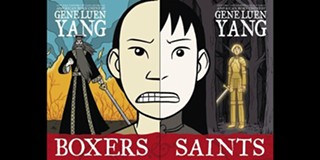The Boxer Rebellion Gets Yang'd But Good
Graphic Novelist Gene Luen Yang brings his newest work to Austin
By Wayne Alan Brenner, 4:30PM, Mon. Sep. 23, 2013
There's the ghost of the first emperor of all China, Qin Shi Huang, in full warrior gear. There's the spirit of St. Joan, Joan of Arc, bright with battle armor. And both of these are only the inspirations for the main characters – Little Bao and Vibiana, respectively – in this new graphic novel just out from publishing powerhouse First Second Books.
Gene Luen Yang's Boxers and Saints is physically heavy enough to be used as a doorstop and narratively deep enough to float two perspectives on a substantial hunk of Chinese (and, to a lesser extent, pushy British Empire) history: The Boxer Rebellion.
Remember that historic event from high-school history class? At least the name of it?
Now the entire complex East/West clash is effectively condensed to two separate books, in one swiftly-flowing and character-focused parallax story, by the author of the Eisner-wining American Born Chinese. I'm telling you this because it's a hell of a fine read. I'm also telling you this because Yang is coming to Austin to promote the books:
Tue., Sept. 24, 6:30-8:30pm, with a display of original artwork, at Guzu Gallery
Wed., Sept. 25, 7pm, at BookPeople.
And I'm reminding you, before we go any farther, that hardworkin' journo Dan Solomon has a substantial interview with the author right here.
Now. Not content to let my comics-loving but thoroughly Anglo ass wax all opinionated about this work – lest the ghost of Edward Said in full samurai gear come at me with, say, a pair of katana – I passed the books along to Leng Wong, local arts mover & shaker and director of Lucky Chaos Theatre, to see what she thought about them. What made this decision even better is that Wong was already familiar with Yang's previous work.
Leng Wong: I read American Born Chinese a while back. And when you read a book like that, like any other book or story that stays with you, you're not sure which parts you've added in yourself over the years. So I re-read it before coming to talk to you, but I was reluctant, because there's some things where you don't want to mess up the way it is in your mind? And it was great, I actually like it now more than I did before. And I think it's because, after doing work for Lucky Chaos for the last two years, working with a lot of younger Asian-Americans, a lot more things made sense to me. I'm from a different generation, right? Both from age, and because I wasn't born here – I grew up in Malaysia, came here when I was seventeen. And so, working with the younger Asian-American artists and performers in town, sometimes I'm just pulling my hair, like "I'm not understanding what's happening." And re-reading American Born Chinese helped me understand where they're coming from and why their voice is so unique.
W. A. Brenner: What were some of your favorite things about Boxers and Saints?
Wong: I really like all the gods, all the mythical gods in it. I grew up with Buddhism, Taoism, and Confucianism – which is basically a bit of everything. Later in life I realized, "Oh, that was Buddhism, and that part was Confucianism," but, growing up, it was all just one big lump of that's-what-you-do, that's-what-you-say, that's-what-happens-when-you-do-bad-things, this-is-what-happens-when-you-do-good-things. One big lump. And those gods were part of everything. Like, the Goddess of Mercy? It was almost a daily thing, like my Mom would say things like, "If you feel sad, just talk to the Goddess of Mercy," and then she'd walk off. And she'd say things like "Oh, that little boy is too much – you'd think he's the Monkey God or something!" It was infused into everyday life and language. And in Boxers there was this one panel, with the whole army going, and they had become these gods. And I was doing this little game in my head, checking off each one, like "Oh, there's the monkey god, there's that god, there's the moon goddess" – which is, you know, the moon goddess from the Mid-Autumn Festival, which was just a few days ago. It was really nice to see all those characters, brilliantly colored, with all the little details on their costumes, and the headdresses. The book is about such a heavy, heavy topic, and it was that one panel that kind of connected with me. Because I've never seen so many of these gods and goddesses and icons – that I grew up with – in a comic book that's in English. So it was strange for me to read this book and see all this familiar stuff in a very unfamiliar presentation. Even Yang's style of drawing is different from the style of the comic books I read when I was growing up – written in Asia by artists in Asia. He's got very clean lines, very simplistic lines.
Brenner: You said earlier that you didn't read the books in order?
Wong: I think it's because I'm not Christian that I purposely read Saints first. Because, personally, I felt like I needed to balance it out, I needed to see what the other side thinks first, so I'm less biased or whatever.
Brenner: And were there particular resonances, besides the depiction of the gods, in the story – in either book?
Wong: It's weird: There are things in each book that I have personally felt – but I don't know if it's a cultural thing? In Boxers, Bao is always drowning when the scary god, the first emperor, is trying to talk to him – he's always in the water and partially drowning. And in Saints, Vibiana's sleeping and some god or something was trying to talk to her. And those are two things I've felt when I was growing up, when I was scared or something, and even later. And I was like, "Oh my god, do other people go through this?" It was strange to read a graphic novel and feel so many little bits of connection here and there.
Brenner: The sensation of drowning?
Wong: Yeah, yeah – for example, this happened not very far from this street, my boyfriend from college broke up with me. And for weeks after, I had bad dreams of drowning, where he'd be in a boat and I'd be drowning and he wouldn't save me. He'd be saving other girls who were drowning, but he wouldn't save me. I had these dreams for a few weeks.
Brenner: Damn. I guess that's one of the ways a story, maybe especially a historical one, can be so effective – that it can connect with someone on that personal a level.
Wong: Yeah, and this is a story that's so different from American Born Chinese – which is something that, I'm guessing, is semi-autobiographical? Because Yang lived that life, there were a lot of details from it – it was rich like that. And Boxers and Saints, it's so far removed – not just in time, but in culture, and graphically. And I like how the colors are so different in the two books. In the Saints world, the colors are very different from the colors of the mythical Chinese gods in Boxers. And I don't know why it feels this way – maybe it's psychological? – but it feels very East and West to me, and I love how even the color scheme was thought out to that detail.
A note to readers: Bold and uncensored, The Austin Chronicle has been Austin’s independent news source for over 40 years, expressing the community’s political and environmental concerns and supporting its active cultural scene. Now more than ever, we need your support to continue supplying Austin with independent, free press. If real news is important to you, please consider making a donation of $5, $10 or whatever you can afford, to help keep our journalism on stands.
March 22, 2024
March 22, 2024
Boxers & Saints, Gene Luen Yang, First Second Books, Austin Books & Comics, Guzu Gallery, BookPeople, Leng Wong, Lucky Chaos Theatre, historical fiction, Asian-American literature, graphic novels, The Goddess of Mercy









